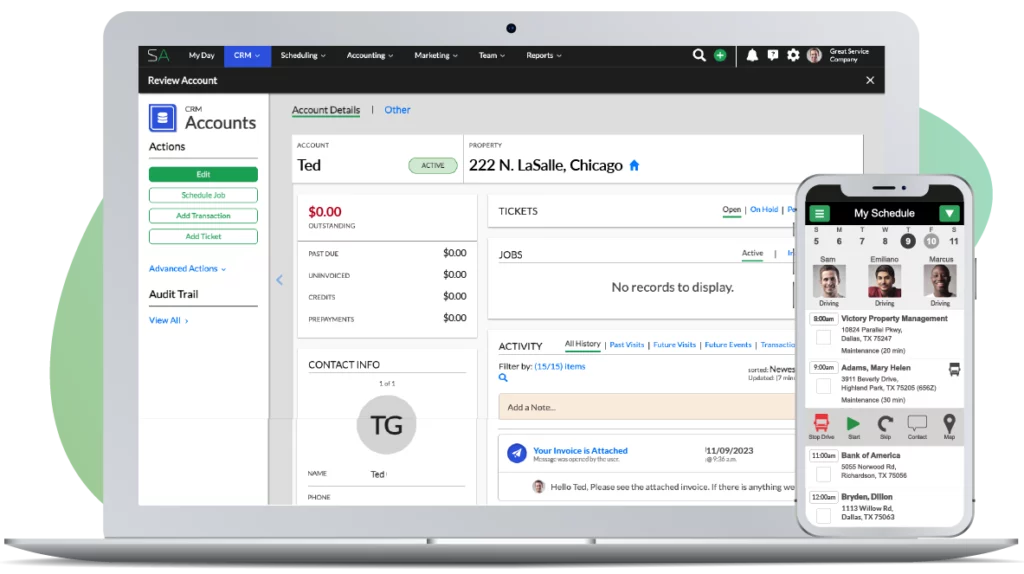Jonathan:
Question, I have a business in the 450,000 and climbing range. I used to be a property management or in property management, and I saw a need for a one stop shop type service for commercial customers. Wanting to fill that void, my business concept has to have, it has three distinct offerings under one company, lawn and landscape, janitorial, general maintenance. We have established great customers in each and have almost limitless possibilities in our metropolitan area. That said, we are at operational capacity for the systems we have in place. They’re crude at best.
We are not exploiting opportunities and I hate that. Would Service Autopilot work, a software company that I own, or partners in, would Service Autopilot work given that we have so many different offerings or do you need to be able to dial it in for a very specific business type?
Second question, and more generally, I sometimes second guess the wisdom I had in getting involved with too many different types of things. What are your thoughts on that?
Let me answer the easiest one first. Specifically to your question about will Service Autopilot work for lawn landscape, janitorial and general maintenance? Yes. Of the thousands of clients that we have the biggest majority are in lawn care. The second biggest majority are in janitorial and cleaning. The third group is in random stuff, plumbing, HVAC, pool care. We have a fair number of services like pool care, pest control, things of that sort. The system will work for all those types of companies, but it will not work for all companies.
For your specific list, yes it will. One of the considerations is that when you have different kinds of clients, residential or commercial, or different kinds of clients in different service industries, like for example, maybe do nightly janitorial, but you also do quarterly strip and wax, or maybe you do weekly lawn mowing and you also do project-based work, something that’s really important because we do in our system what’s called automated invoicing. It automatically generates your invoices. We know all your time, your materials, we know exactly what you’re doing. We know who’s doing it, all that stuff, so we can just generate your invoices for you.
What you can do in the system in case this crosses your mind, you can tell the system, for this client I bill them every week and I auto charge their credit card. For this clients, I bill them once a month and I get paid by check. You can tell the system exactly how you work. We’ve got to let Service Autopilot clients that sort of follow my model at my lawn care company where they auto charge the credit card for all mowing. We do it for all services, but they do it just for mowing, so they have their clients setup where if it’s a mowing client auto generate invoice every week or every day, and then charge their credit card. If you trim bushes or do irrigation or anything else for that client, put that on the monthly invoice and just wait for a check.
The system figures all that stuff out. There are defaults where you don’t have to go and specify it for every client. You just do it for the exceptions. Kind of a long answer, simply to say yes, we can totally support that and we have thousands and thousands of clients that already that do that or are in all these industries.
To your bigger question, or the one I viewed as the bigger question. Sometimes I second guess the wisdom of being full service in the three different areas that you’re talking about. I would agree with you. I like the one stop shop business model. I was a partner in a cleaning company to nine years ago now I believe it was, and our core business was janitorial and then there was a whole special project side to the business, like cleaning screens in movie theaters and seats and carpet cleaning and mold remediation, all these other things. If priced correctly, those other things could be big profit areas for the company and also it made us very desirable. You could hire us for one thing and we could take care of whatever you need. It also put a note, in a sense, around our business that we didn’t let a competitor slip in because they could clean carpet and eventually our whole contract, so I really like that strategy. That was a big company so it was easier to do such a thing, meaning offer a lot of services.
When the company’s young, I don’t like that model. I think that model of being, serving a number of different industries or providing too many services when you’re small is very complicated because you don’t have enough people to be really good at the individual activities. You end up becoming subpar at everything you do in your company. You become in a sense strained. You just don’t have enough people with enough experience to do everything that’s coming in. It also makes it difficult to market because you’re not focused. You can’t be for any one client. You can’t be all in for them and be the expert just for them.
My preferred strategy is one of where in the beginning you’re very focused and you pick just a couple things. You become the best at them. Your people are very well trained to do just those things, and then over time, you layer on the different service offerings over time. You quit thinking about yourself as just a lawn care company or janitorial company. You start looking for where is the money at and what do my clients need? What would be the dream come true service offering for them? You start offering additional services, but that’s a down the road strategy, and long-term it’s a very profitable strategy because then your client value, how much one client is work to you, grows, grows, grows, and if all your competitors client value’s very small as compared to yours, you can out market them, meaning and you can out sell them. You can afford to spend way more to acquire a client than they can and so you can take serious market share.
There’s a whole lot of concepts layered into everything I just said and we could go really deep with that. I love the long-term strategy of the one stop shop, but that’s a long-term strategy. If you feel like things are slipping, falling apart, breaking, breaking is normal. As you grow a company at all these different levels, your company and processes and systems keep breaking. You got to fix them. That’s why growth happens. That’s why if you look at the number of companies that do over 10 million a year it’s like less than half a percent, I think. It’s really small. If you look at how many companies do over just a million a year in the different industries that you named, it’s a very small number. That’s because most people don’t fix these things as they keep breaking or they get worn out and they don’t bring people in to help them and so they never grow their company in anything of size.
With all that being said, if everything’s breaking and you can’t fix it you might think about a strategy of simplification. Simplification has changed my life in every business I’ve been in. I always start with a plan this big and I get hit in the face with the reality of building the thing and the plan becomes this and then the plan comes to that. Once we start building out the team and the leadership, we have some money, we got cash flow, then the plan starts coming back and growing.
I love that strategy. It’s a strategy that works. It goes against my personality because I want to do everything now, but everything now doesn’t work. Have a big master plan, work the plan. That’s the fastest way to get to where you want to go, and the most profitable way to get to where you want to go.
Podcast: Play in new window | Download
Subscribe: RSS



